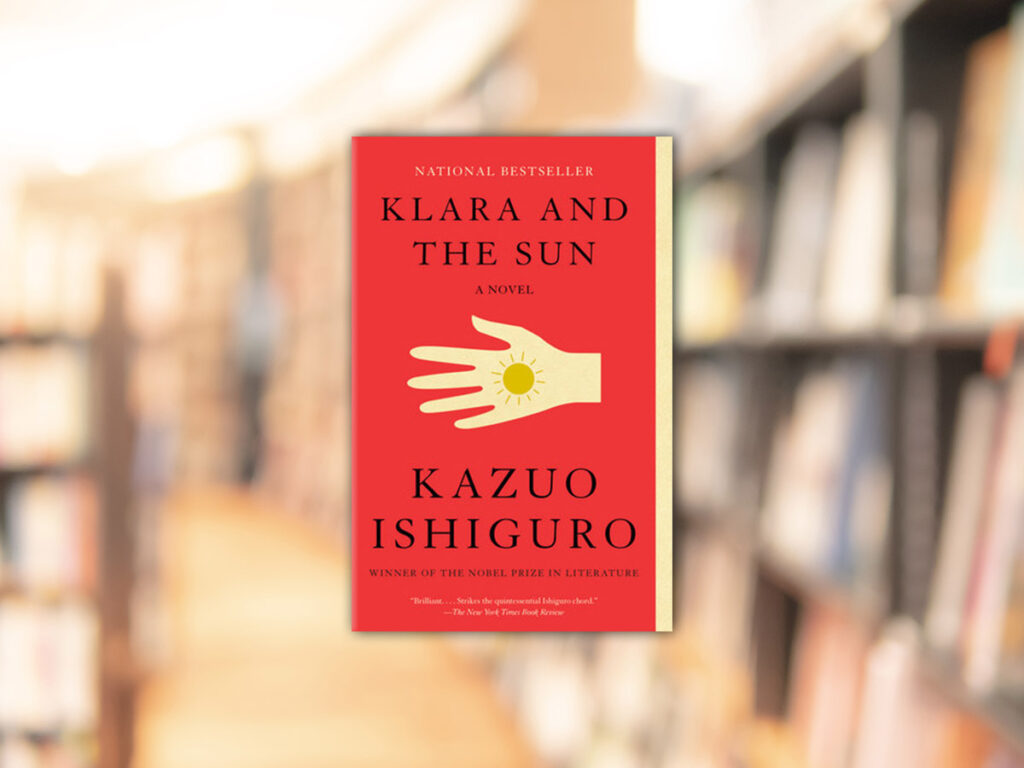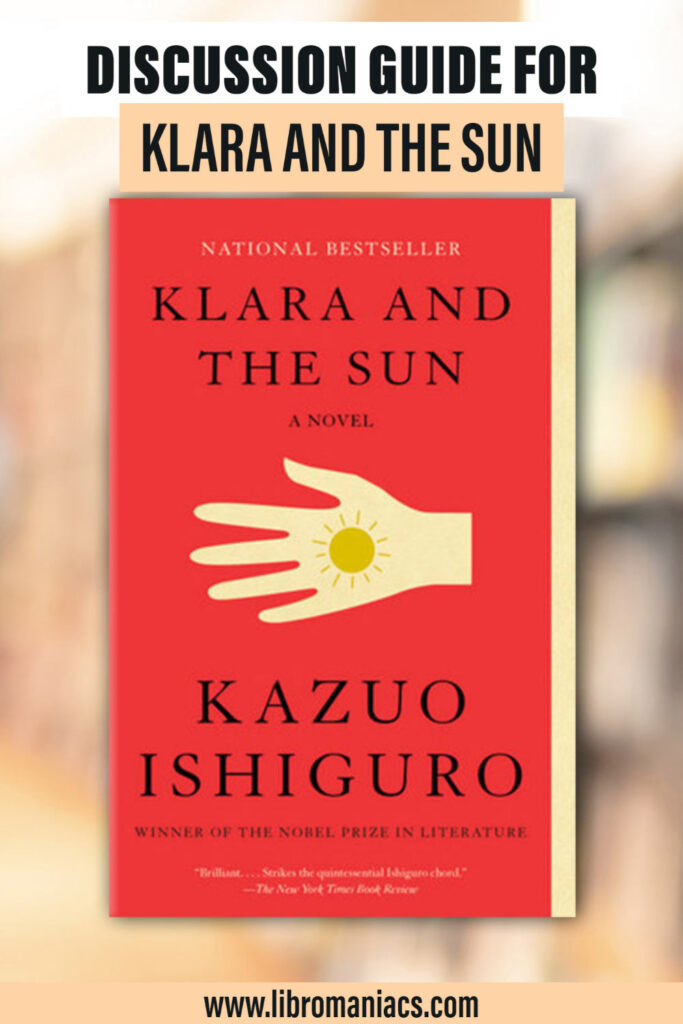Klara and the Sun is a dystopian science fiction novel about Klara, a solar-powered Artificial Friend built to be sold as a children’s toy. Josie, a girl with an unspecified illness, takes Klara home to be her companion through her lonely years from adolescence until college. Klara herself narrates the story, which creates a contradictory perspective that mirrors the book’s layered and diverging concepts. She is keenly observant, but her vision is comprised of squares and panels; she is perceptive but stiff; empathic but limited.
This book’s premise raises some pretty complex themes like: what is personhood, the nature of obsolescence, loneliness and love. Our Klara and the Sun Book Club Questions will help your group navigate and discuss these themes.
This Klara and the Sun Discussion Guide also includes the book’s synopsis, some discussion-worthy reviews, and further recommendations. If you liked it, keep scrolling because we have three books like Klara and the Sun for your next Book Club read!

(This article contains affiliate links. This means that if you choose to purchase, I’ll make a small commission.)
Klara and the Sun Synopsis
Klara and the Sun, Kazuo Ishiguru
Here is the story of Klara, an Artificial Friend with outstanding observational qualities, who, from her place in the store, watches carefully the behavior of those who come in to browse, and of those who pass on the street outside. She remains hopeful that a customer will soon choose her. Klara and the Sun is a thrilling book that offers a look at our changing world through the eyes of an unforgettable narrator, and one that explores the fundamental question: what does it mean to love?
10 Klara and the Sun Book Club Questions
These questions have been tailored to this book’s specific reading experience, but if you want more ideas, we also have an article with 101 generic book club questions.
- Why did Ishiguro choose to tell the story from Klara’s perspective? How would the novel have been different if Josie, or her mother, had told it?
- Did you relate to Klara? Find her likeable? Empathize with her? What about her character or storytelling made this easier or harder?
- Klara, a personified machine, personifies the sun. Why does she do this? What does it mean to be a person? Are all people humans? Are all humans people?
- When Miss Helen meets Klara, she says, “One never knows how to greet a guest like you. After all, are you a guest at all? Or do I treat you like a vacuum cleaner?” What does she mean by this? How would you react upon meeting Klara?
- In the novel, workers have been “substituted” by machines who do their labor. At various points in the book, we hear from characters who support substitution, like Josie’s father, and some who oppose it, like the woman at the theater. Why are their opinions different? Who benefits from substitution?
- Klara is an outdated model of AF, children who haven’t been “lifted” are kept from schools, and workers are dispensable and unwanted. How do you feel about this recurring theme of obsolescence? How do we treat obsolescent people and things?
- Why do parents choose to have their children “lifted”? Is it fascistic, as Miss Helen suggests? Is it eugenics? Is there an analogous practice to “lifting” in our real world?
- What has changed about each of the characters by the end of the book? Have they grown? Have their circumstances improved? Did you find it hopeful? Or tragic?
- What has the book taught you? About people, technology, or love? What will you take away from it the most?
- ““There was something very special, but it wasn’t inside Josie. It was inside those who loved her.”
Does technology change the way that we relate to one another? Does it enhance or limit our capacity for love?
Selected Reviews for Klara and the Sun
“Ishiguro looks at humanity from a slightly different angle than in Never Let Me Go, but seeks the answer to the same question: What makes us human? Are we merely sophisticated machines held together by a bundle of data or is there something inside us that can’t be replicated? Or is it perhaps the love we are able to ignite in others that makes us special?”
“I am sad to say I really didn’t find the concept entirely credible or imaginable. I can believe it might be possible in the future to produce a super intelligent neo human machine, but I found the book’s use of the supposed learning and inquisitiveness of this machine to be inconsistent. It developed what appeared to be infantile notions about the world around her but took no steps to read, access information sources, speak in depth to anyone or truly question the theories she had developed.”
“Overall, it’s hard for me to know what to think of this book because it didn’t say much. There was a lot of potential, but the story ended up only scratching the surface. It feels unfinished, with a fluffy slapdash ending that didn’t even come close to addressing any of the worthwhile topics in here.”
“Ishiguro has an unparalleled ability to craft dystopian societies which are simultaneously shocking and disorientating, yet oddly familiar — they are believable because they take present values or ideas and stretch them to the extreme. He also has an unmatched ability to construct scenes in which misunderstandings cause conflict, so awkward and frustrating that the reader wishes they could intervene.”
3 Books Like Klara and the Sun
Klara and the Sun was long listed for the Booker Prize. If your book club likes reading award winners, we have guides for Booker nominees like, Such a Fun Age, Small Things Like These, The Testaments and Girl, Woman, Other. If you want more ethical dilemmas and dystopia, check out our reading guide for The Sea of Tranquility or these climate fiction books.

Never Let Me Go, Kazuo Ishiguru
If you liked Klara and the Sun, you’ll love Ishiguro’s earlier novel, Never Let Me Go. It’s another foreboding, dystopian novel with overlapping but unique themes about science, love, and autonomy. It’s set in an alternate version of England in the 1990s, in which “guardians” are cloned and raised for the sole purpose of donating their organs to their counterparts. It’s a complex, romantic story that will surprise you.

A Closed & Common Orbit, Becky Chambers
A Closed and Common Orbit is for anyone interested in science fiction, artificial intelligence, and human relationships in a variety of scenarios. Lovelace is a machine who suddenly finds herself in a human body with no memories of her past. She and engineer Pepper develop a friendship that explores themes of identity, intimacy, and finding meaning.
Set in the coldness of space, this book is very warm and has a strong found-family vibe.

Machines Like Me, Ian McEwan
If you love provocative, unsettling books and reading about love, families, and jealousy, check out Machines Like Me. The novel is set in an alternative reality of the 1980s, in which the UK lost the Falklands War, Alan Turing is alive, and technology is far more advanced than it is today.
Adam, an android, is the protagonist, and the story explores his relationship and love triangle with his owners, Charlie and Miranda.
Have a listen on Audible. Try audio books for free for 30 days.
Share these Klara and the Sun book club questions with your friends:

